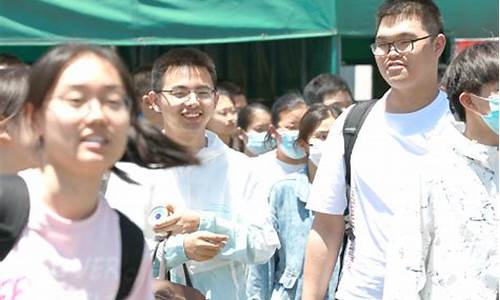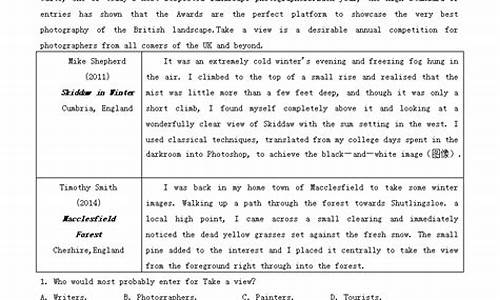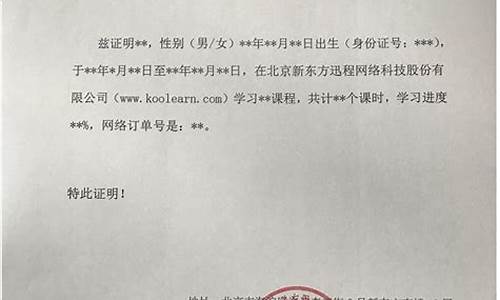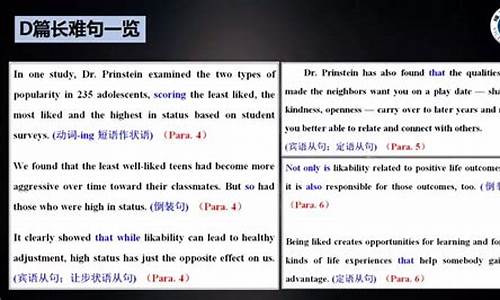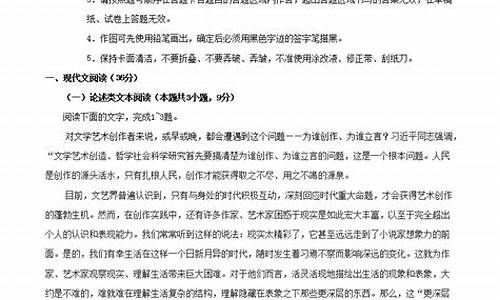您现在的位置是: 首页 > 专业报考 专业报考
2014福建英语高考完型_2014年福建高考英语作文
tamoadmin 2024-06-10 人已围观
简介1.求2014江西英语高考完形填空翻译2.求福建省历年高考英语听力音频和原文3.2014辽宁高考英语完形4.福建高考英语阅读训练题及答案解析?5.2014年全国二卷高考英语题型有哪些2014年我参加了英语二考试,就2014年英语二的难度我认为,完型比一稍微简单容易把握,但并不简单多少;新题型比一简单,但2014有变难趋势,与一主要题型不同,主要考选标题和细节7选5;对于作文大作文比一少了5分,主题
1.求2014江西英语高考完形填空翻译
2.求福建省历年高考英语听力音频和原文
3.2014辽宁高考英语完形
4.福建高考英语阅读训练题及答案解析?
5.2014年全国二卷高考英语题型有哪些
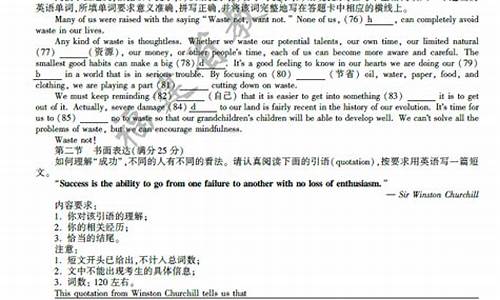
2014年我参加了英语二考试,就2014年英语二的难度我认为,完型比一稍微简单容易把握,但并不简单多少;新题型比一简单,但2014有变难趋势,与一主要题型不同,主要考选标题和细节7选5;对于作文大作文比一少了5分,主题好把握应该不会跑题,但不好得高分,小作文总体差不多;最主要是阅读,不要说二简单多少,考察形式不同,虽然超纲词比一少,选项也短,但是这都不是他要考的方面,主要是考文章理解,英语一的选项是难,但考同义替换比较多,选项规律性强,不好论谁简单。不要听外面人说英语二简单就信了,13年和以前的还算比较简单,但2014难度有所提升,因为才有英语二没几年,还没有完全定型,估计15的难度也不会降低多少,不要大意,也不要完全按照英语一的套路做英语二,不太适用。你要相信教育部那帮傻叉天天没事就研究怎么给你挖坑,不会让你那么好过的。
求2014江西英语高考完形填空翻译
1-6 BCBABA
II. 1. team 2. prefer 3. almost 4. join 5.term 6. win 7. rowing
III. 1. is going to be 2. toplay 3. cycle 4.skating 5. am going to see
IV. 1. during the summer holidays 2. Are yougoing to join 3. have a game against
V. are talking, to play, are going to have, isgoing to cheer, to win
求福建省历年高考英语听力音频和原文
“Mum, can I invite my classmate Brett over to stay tomorrow night, please? It’s Friday, and we don’t have any _36__.Can I, please?” Mum was sitting at the kitchen table.Dad was _37__next to her, resting his head on his arms.Mum could _38__that James wanted so badly to have his friend over.
“I’m so sorry, James,” she said.
“I’m never allowed to have friends come to the house? Why, Mum?” James asked sadly, almost in _39__.
“I know it’s _40__ for you,” Mum said softly.“But I’m just worried other people might think we’re a little… strange.And then they would make fun of you.”
“No, they wouldn’t, Mum,” James protested.“We’re not _41__ at all.We’re just ordinary people.”
Mum sighed heavily.“To tell you the truth, James, my neck has been so painful that it’s given me a heavy _42__.And your poor father –he doesn’t feel _43__.He really needs a rest.”
“I can help, Mum!” James said.“_44__ I can make you and Dad feel better, can Brett come over? Please?”
“Well…”Mum began.
“Great! Thanks, Mum!” James almost shouted.“Just sit there, don’t move.” He rushed over to the kitchen drawer and _45__ what he needed –two spanners.“Hang on, Mum,” he said.“This won’t take a second.” After some _46__, James was finished.With a smile of _47__ on his face he said, “There! How does that feel?” “Oh, James,” Mum said.“That’s a much better! How did you do it?”
“Easy,” James said _48__.” Dad had tightened your neck bolts (螺栓) too much! I just_49__ them slightly! I learned that in robotic science at school.”
“What about you father? Can you ___ him?” asked Mum.
“I’ll try,” James replied.He __51_ up Dad’s hair at the back of his neck.and plugged the electric wire into Dad’s head.Then he turned the _52__on.Dad opened his eyes and _53__ immediately.“He just let his _54__run too low, that’s all,” James said, “Shall I tell Brett to come over straight after school tomorrow?”
“I guess so,” replied Mum.“Your friends will just have to _55__ that we are a very unusual family.Thanks, son!”
“妈妈,我可以邀请我的同学布雷特在待明天晚上,好吗?今天是星期五,我们没有任何_36__.Can我,好吗?“妈妈是坐在厨房table.Dad _37__next对她来说,他的头在他的休息arms.Mum _38__that詹姆斯很想有他的朋友。
“我很抱歉,詹姆斯,”她说。
“我决不允许有朋友来家里吗?妈妈,为什么?”詹姆斯问可悲的是,几乎在_39__。
“你,我知道这是_40__”妈妈轻声说。“但是我只是担心别人会认为我们有点…strange.And然后他们会取笑你。”
“不,他们不会,妈妈,”詹姆斯抗议。“我们不是_41__给我们只是普通人。”
妈妈叹了口气。“实话告诉你,詹姆斯,我的脖子一直如此痛苦,这给了我一个沉重的_42__.And你可怜的父亲——他并不觉得_43__.He真的需要休息。”
“妈妈,我能帮你!”詹姆斯说。“_44__爸爸我可以让你感觉更好,布雷特能过来吗?请?”
“嗯…”妈妈开始。
“太好了!谢谢你,妈妈!”詹姆斯几乎喊道。“只是坐在那里,不要动。”他冲到厨房的抽屉里和_45__需要两个扳手。“等一下,妈妈,”他说,“这不会花。“一些_46__之后,詹姆斯finished.With _47__微笑的脸上,他说,“那里!你觉得怎么样?”“哦,詹姆斯,”妈妈说,“这是一个更好的!你是怎么做到的?”
“容易,”詹姆斯_48__说,“父亲收紧你的脖子螺栓(螺栓)太多了!我just_49__他们略!我知道在学校机器人科学。”
“你父亲怎么样?你能___他吗?”妈妈问。
“我要试试,”詹姆斯replied.He __51_爸爸的头发在他neck.and电线插到爸爸的head.Then他把_52__on.Dad睁开眼睛,立即_53__。“他只是让他_54__run太低,就这样,”詹姆斯说,“我告诉Brett明天放学后直接过来吗?”
“我想是的,”妈妈回答说。“你的朋友只能_55__,我们是一个非常不寻常的family.Thanks,儿子!”
2014辽宁高考英语完形
2014年福建省高考英语听力原文
Text 1
W: Excuse me. This is the address. How do I find it?
M: Right. You’ll need a street map. Here’s one, and I’ll show you where it is.
Text 2
W: Oh my! My car broke down, and I have to meet my aunt at the railway station before noon.
M: You’re lucky. I can drop you off on my way.
Text 3
W: Did you hear that Mr. Peterson is coming next week, Gordon?
M: Yes, so I called all the department heads to my office this morning. We need to give him reports on our program.
Text 4
W: I hope you like the book I lent you. I wasn’t sure if you’d be interested.
M: I had the same doubt at first. But once I started, I simply couldn’t put it down.
Text 5
W: What is going on? It’s May, and we still have to wear warm clothes.
M: Well, there’s some good news on the radio. You probably can wear shorts tomorrow.
Text 6
W: Harry, let’s play some ping-pong today.
M: I’d love to play a set or two, but my right arm hurts. I’ve decided to stop playing ping-pong until it feels better.
W: Well, how about going skating?
M: I’d like to, but my knee hurts, too.
W: Harry, stop making excuses! You’re just lazy.
M: No, I’m not! You know, there’s a basketball match on TV today. Let’s just stay home and watch it.
W: OK. You stay, and I’ll play with Helen.
Text 7
W: What do you want to do tonight?
M: How about going to the cinema? I should be home from work at 5:45. Then we can go out and eat before we see a film.
W: What do you want to see?
M: There’s a good art film at the Green House Cinema.
W: Let’s see…it starts at 6:15. I don’t think we can get there in time to see the beginning. How about the action film at the New State Cinema? It starts at 6:50. Perhaps the 7:00 one at the UME Cinema is even better. It stars Jackie Chan.
M: OK, that’s fine. I like him, too.
Text 8
M: Hey, Lucy. Do you have some time to talk about next week’s trip with me?
W: Sure, Dave.
M: OK. So, we’re leaving on Monday from Hartsfield International Airport, and returning on Friday. Do we take ourselves to the airport? Maybe we need to book a taxi, or just go by bus.
W: No, we don’t have to. The company car will pick us up and take us there.
M: Oh, that’s good. When?
W: Our flight leaves at 11:00 a.m., so they should pick us up between 8:00 and 9:00 a.m. Besides, the company pays for our trip, including hotel and food.
M: How much will that be?
W: Well, New York is a pretty expensive city. So, each of us will get $200 a day.
M: Oh, OK. Thanks for telling me that.
W: You’re welcome.
Text 9
W: Please sit down. Let’s see…you’re Mr. Smith. Is that correct?
M: Yes. John Smith.
W: And you’re interested in this job?
M: Yes, I am. I’ll graduate from college the coming June. My major is Chinese.
W: I see. Have you ever done any work in this field?
M: Yes, I used to be a tour guide for Chinese travellers.
W: Good. Now, how much money do you expect to have for a year?
M: From what I’ve read, it seems that a starting pay would be around $12,000 a year.
W: Here, you would start at $10,500 for the first year…a kind of training period. Then you would go to $15,000.
M: That sounds fair enough. What do you think are the chances for me to get a job here?
W: Well, I’m talking to three people today and four tomorrow. We’ll be hiring two people. You’ll hear from us sometime next month. Good luck! And thanks for coming in today.
Text 10
M: Well, I’d love to share with you my personal opinions on city life and life in small towns. I grew up in a small town until I was 18 and then moved to a big city, so I have experienced the good and bad sides of both. I never thought that I would like living in a big city, but I was wrong. After ten years of living in one, I can’t imagine ever living in a small town again. Surely small towns and big cities both have some problems in terms of transport. In a small town, you have to own a car to make life comfortable. You can’t get around without one because there isn’t any kind of public transport. Big cities generally have heavy traffic and expensive parking, but there you have a choice of taking public transport, which is cheaper than driving. So, if you don’t have a car, you’d better live in the city. I also love the exciting life in big cities. I can always enjoy a lot of films, concerts, and other wonderful shows. However, these things are not common in small towns. The final thing I like about large cities is that you can meet different kinds of people. However, you seldom find such a variety of people in a smaller town. I think that living in an area where everyone was just like me would quickly become dull. Of course, safety should be considered, and that’s one area where small towns are better than big cities. Still, I would rather be a bit more careful and live in a large city than to feel safe but dull.
第一节(共5小题,每小题1.5分,满分7.5分)
听下面5段对话。每段对话后有一个小题,从题中所给的A、B、C三个选项中选出最佳选项,并标在试卷的相应位置。听完每段对话后,你都有10秒种的时间来回答有关小题和阅读下一小题,每段对话仅读一遍。
例:How much is the shirt?
A. £19.15 B. £9.18 C. £9.15
答案是C。
1.What does the woman want to do?
A. Find a place. B. Buy a map. C. Get an address.
2.What does the man do for the woman?
A. Repair her car B. Give her a ride C. Pick up her aunt.
3.Who might Mr. Peterson be?
A. A new professor B. A department head C. A company director.
4. What does the man think of the book?
A. Quite difficult. B. Very interesting. C. Too simple.
5. What are the speakers talking about?
A. Weather B. Clothes C. News.
第二节(共15小题,每小题1.5分,满分22.5分)
听下面5段对话或独白,每段对话或独白后有几个小题,从题中所给的A、B、C三个选项中选出最佳选项,并标在试卷的相应位置。听每段对话或独白前,你将有时间阅读各个小题,每小题5秒钟;听完后,各小题给出5秒钟的作答时间。每段对话或独白读两遍。
听第6段材料,回答6、7小题。
6. Why is Harry unwilling to join the woman?
A. He has a pain in his knee.
B. He wants to watch TV.
C. he is too lazy.
7. What will the woman probably do next?
A. Stay at home.
B. Take Harry to hospital.
C. Do some exercise.
听第7段对话,回答8、9小题。
8. When will the man be home from work?
A. At 5:45 B. At 6:15 C. At 6:50
9. Where will the speakers go?
A. The Green House Cinema. B. The New State Cinema. C. The UME Cinema.
听第8段对话,回答第10至12题。
10. How will the speakers go to New York?
A. By air. B. By taxi. C. By bus.
11. Why are the speakers making the trip?
A. For business. B. For shopping. C. For holiday.
12. What is the probalbe relationship between the speakers?
A. Driver and passenger B. Husband and wife C. Fellow workers.
听第9段对话,回答第13至16题。
13. Where does this conversation probably take place?
A. In a restaurant. B. In an office. C. In a classroom.
14. What does John do now?
A. He’s a trainer. B. He’s a tour guide. C. He’s a college student.
15. How much can a new person earn for the first year?
A. $10,500. B. $12,000. C. $15,000.
16. How many people will the woman hire?
A. Four B. Three C. Two
听第10段材料,回答第17至20题。
17. How long has the speaker lived in a big city?
A. One year. B. Ten years. C. Eighteen years
18. What is the speaker’s opinion on public transport?
A. It’s comfortable B. It’s time-saving C. It’s cheap.
19. What is good about living in a small town?
A. It’s safer. B. It’s healthier. C. It’s more convenient.
20. What kind of life does the speaker seem to like most?
A. Busy. B. Colourful. C. Quiet.
福建高考英语阅读训练题及答案解析?
在本句中,I 是可以明确感知她的愤怒的,只能用Could。might 的程度太轻。
关于could 和might 的用法一下给出详解:
用于疑问句表示请求时,一般只用Could,且可用于各人称。如:
Could you help me explain the difference between "might" and "could"?
Could I use your mobile phone a little while?
上句可用May代替:May I use your mobile phone a little while?
用Might也是可以的,但不常见。
2. could和might都可用在条件句中,表示假想的情况。表示“本来会、本来可以/能够”。例如:
If you tried you could/might do the work better. 如果你试试的话,准能把那项工作干得更好。
You could have met her if you had gone that way. 如果你走那条路的话,你准能遇见她。
此句中的could如改成might则表示:……,你也许能见到他。
They could/might have worked it out if they had asked me for help. 如果他们来向我求助的话,他们本能够做出来的。
He could/might have give the answer, but he refused to. 他本来能够回答的,但他拒绝这么做。
You were stupid to go skiing there — you could have broken your leg. 你真笨,竟会到那地方滑雪。你本来会摔断腿的。
上面的例句中用might则因其语气较轻而语意效果不甚理想。
在此场合,could和might的区别是could较might的可能性强。
3. couldn't be + 比较级句型不能用might代替。如:
Their lifestyles couldn't be more different. 他们的生活方式极为不同。
4. could和might都可用在表示“结果”的状语从句中,同样,could语气较重些。例如:
He expressed his ideas clearly so that the average person might understand. 他把他的意思清楚地表达出来,以便一般人能听明白。
5. might as well表示“不妨、可以、倒不如”,此时的might是不能用could代替的。例如:
We might as well look for some food now. 现在我们不妨找些吃的东西。
I expect I might as well be going. 我希望我可以走了。
Since it’s a fine day we might as well walk. 既然是一个晴朗的天,我们不妨步行。
We might as well have gone home as you suggested. 我们还不如按你建议的回家去呢。
2014年全国二卷高考英语题型有哪些
想要提高福建高考英语阅读得分,就要在平时坚持阅读的训练。下面我为大家带来福建高考英语阅读训练题解析,欢迎考生阅读训练。
福建高考英语阅读训练题***一***
Mr. Peter Johnson, aged twenty-three, battled for half an hour to escape from his trapped car yesterday when it landed upside down in three feet of water. Mr. Johnson took the only escape route—through the boot***行李箱***.
Mr. Johnson’s car had finished up in a ditch***沟渠*** at Romney Marsin, Kent after skidding on ice and hitting a bank. “Fortunately, the water began to e in only slowly,” Mr. Johnson said. “I couldn’t force the doors because they were jammed against the walls of the ditch and dared not open the windows because I knew water would e flooding in.”
Mr. Johnson, a sweet sale *** an of Sitting Home, Kent, first tried to attract the attention of other motorists by sounding the horn and hammering on the roof and boot. Then he began his struggle to escape.
Later he said, “It was really a half penny that saved my life. It was the only coin I had in my pocket and I used it to unscrew the back seat to get into the boot. I hammered desperately with a hammer trying to make someone hear, but no help came.”
It took ten minutes to unscrew the seat, and a further five minutes to clear the sweet samples from the boot. Then Mr. Johnson found a wrench and began to work on the boot lock. Fifteen minutes passed by. “It was the only chance I had. Finally it gave, but as soon as I moved the boot lid, the water and mud poured in. I forced the lid down into the mud and scrambled clear as the car filled up.”
His hands and arms cut and bruised***擦伤***, Mr. Johnson got to Beckett Farm nearby, where he was looked after by the farmer’s wife, Mrs. Lucy Bates. Huddled in a blanket, he said, “That thirty minutes seemed like hours.” Only the tips of the car wheels were visible, police said last night. The vehicle had sunk into two feet of mud at the bottom of the ditch.
1. What is the best title for this newspaper article?
A. The Story of Mr. Johnson, A Sweet Sale *** an
B. Car Boot Can Serve As The Best Escape Route
C. Driver Escapes Through Car Boot
D. The Driver Survived A Terrible Car Accident
2. Which of the following objects is the most important to Mr. Johnson?
A. The hammer. B. The coin.
C. The screw. D. The horn.
3. Which statement is true according to the passage?
A. Mr. Johnson’s car stood on its boot as it fell down.
B. Mr. Johnson could not escape from the door because it was full of sweet jam.
C. Mr. Johnson’s car accident was partly due to the slippery road.
D. Mr. Johnson struggled in the pouring mud as he unscrewed the back seat.
4. “Finally it gave” ***Paragraph 5*** means that _______.
A. Luckily the door was torn away in the end
B. At last the wrench went broken
C. The lock came open after all his efforts
D. The chance was lost at the last minute
5. It may be inferred from the passage that _______.
A. the ditch was along a quiet country road
B. the accident happened on a clear warm day
C. the police helped Mr. Johnson get out of the ditch
D. Mr. Johnson had a tender wife and was well attended
福建高考英语阅读训练题答案
1. C。主旨题。根据第1段 Mr. Peter Johnson…escape from his trapped car…through the boot 可归纳出文章的标题为答案C。
2. B。细节题。根据第4段 Mr. Johnson 所说的话及他后面所做的事情可推知此题答案为B。
3. C。细节题。根据第2段第一句…skidding on ice and hitting a bank 可推知答案为C。
4. C。词句理解题。根据其上文 …work on the boot lock 及下文 but as soon as I moved the boot lid, the water and mud poured in 可推知此题答案为C。
5. A。推断题。根据第4段最后一句 but no help came 及最后一段的第一句 Mr. Johnson got to Beckett Farm nearby 可推知地点是在寂静的农村,此题答案为A。
福建高考英语阅读训练题***二***
We spent a day in the country, picking wild flowers. With the car full of flowers we were going home. On our way back my wife noticed a cupboard ***柜厨*** outside a furniture shop. It was tall and narrow. “Buy it, ” my wife said at once. “We’ll carry it home on the roof rack. I’ve always wanted one like that.”
What could I do? Ten minutes later I was £20 poorer; and the cupboard was tied on the roof rack. It was six feet long and eighteen inches square, quite heavy too.
In the gathering darkness I drove slowly. Other drivers seemed unusually polite that evening. The police even stopped traffic to let us through. Carrying furniture was a good idea.
After a time my wife said, “There’s a long line of cars behind. Why don’t they overtake, I wonder?” In fact a police car did overtake. The two officers inside looked at us seriously as they passed. But then, with great kindness, they led us through the rush-hour traffic. The police car stopped at our village church. One of the officers came to me.
“Right, sir, ” he said. “Do you need any more help?”
I was a bit puzzled. “Thanks, officer, ” I said. “You have been very kind. I live just on the road.”
He was staring at our car, first at the flowers, then at the cupboard. “Well, well, ” he said, laughing. “It’s a cupboard you’ve got there! We thought it was something else.”
My wife began to laugh. The truth hit me like a stone between the eyes. I *** iled at the officer. “Yes, it’s a cupboard, but thanks again.” I drove home as fast as I could.
1. In fact the hu *** and _______ the cupboard.
A. would like very much to buy B. badly wanted
C. was glad to have bought D. would rather not buy
2. Other drivers thought they were _______.
A. carrying a cupboard to the church
B. sending flowers to the church
C. carrying nothing but a piece of furniture
D. going to attend a funeral***葬礼*** at the church
3. The police will be more polite to those who are _______.
A. driving in gathering darkness B. in great sorrow ***悲痛***
C. driving with wild glowers in the car D. carrying furniture
4. What did the hu *** and think of this matter?
A. It was very strange. B. He felt ashamed of it.
C. He took great pride in it. D. He was puzzled at it.
福建高考英语阅读训练题答案
1. D。推断题。根据文章第2段作者对买柜子的想法:要花钱、又长又笨重,从而推断出作者心里不愿意,由此可知答案为D。
2. D。推断题。根据第4段倒数第2句:警察的车停在教堂及第7段警察看车的情形:花草又看柜子,说:我们以为是别的什么东西。可推断出此题答案为D。
3. B。推断题。根据文章中对警察关心作者的描述及警察对作者车上东西的看法可推断出警察以为作者去参加葬礼,所以对作者特别关心,由此可知答案为B。
4. B。推断题。根据文章最后一段的描述:好像一块石头击中了我的眉心,于是我尽快地把车开回家,可看出作者对此很羞愧,从而推断出此题答案为B。
2014年全国二卷高考英语题型有哪些
BACAC CBBAA CCAAB CABCAABCCD BCBBD BDDAA BCDAA CDCAB DBCBD ACABDBACB BABD CBB BCDA CFADG找了半天 做了很久了 听力上没红笔迹 应该对。345我们也都做完了
全国二卷物理有哪些题型我看了近5年的全国二卷,1、机械能年年考,往往结合圆周、平抛和简单的动量守恒;2、带电粒子在磁场中的运动几乎年年考;3、电磁感应(E=Blv)出现的机率较大。请关注::hi.baidu./shuwuxiezhitan。我会经常更新关于高考的看法。
2016年高考全国二卷题型有什么变化?一、单项选择题由原来10个小题增为15个,分值15分。二、完型填空分值减为20分,但仍为20个空,每空由原1.5分降为1分。三、完成句子2分一题,共10小题,给出全句汉语,但英语是全句翻译还是部分翻译还未定。听力和写作保持不变
我们老师说对词汇和短语要求加强了
全国二卷化学大题有哪些题型推断 实验 还有一些填空 至于难些你拿一份卷子看就行了呗
高考全国二卷语文题型答题技巧高考语文答题技巧与模式
(一)某句话在文中的作用:
1、文首:开篇点题;渲染气氛(散文),埋下伏笔(记叙类文章),设定悬念(小说,但上海不会考),为下文作辅垫;总领下文;
2、文中:承上启下;总领下文;总结上文;
3、文末:点明中心(散文);深化主题(记叙类文章文章);照应开头(议论文、记叙类文章文、小说)
(二)修辞手法的作用:
(1)它本身的作用;(2)结合句子语境。
1、比喻、拟人:生动形象;
答题格式:生动形象地写出了+物件+特性。
2、排比:有气势、加强语气、一气呵成等;
答题格式:强调了+物件+特性
3;设问:引起读者注意和思考;
答题格式:引起读者对+物件+特性的注意和思考
反问:强调,加强语气等;
4、对比:强调了?突出了?
5、反复:强调了?加强语气
(三)句子含义的解答:
这样的题目,句子中往往有一个词语或短语用了比喻、对比、借代、象征等表现方法。答题时,把它们所指的物件揭示出来,再疏通句子,就可以了。 (四)某句话中某个词换成另一个行吗?为什么?
动词:不行。因为该词准确生动具体地写出了?
形容词:不行。因为该词生动形象地描写了?
副词(如都,大都,非常只有等):不行。因为该词准确地说明了?的情况(表程度,表限制,表时间,表范围等),换了后就变成?,与事实不符。
(五)一句话中某两三个词的顺序能否调换?为什么?
不能。因为:
(1)与人们认识事物的(由浅入深、由表入里、由现象到本质)规律不一致。
(2)该词与上文是一一对应的关系。
(3)这些词是递进关系,环环相扣,不能互换。
(六)段意的概括归纳
1.记叙类文章:回答清楚(什么时间、什么地点)什么人做什么事。 格式:(时间+地点)+人+事。
2.说明类文章:回答清楚说明物件是什么,它的特点是什么。
格式:说明(介绍)+说明物件+说明内容(特点)
3.议论类文章:回答清楚议论的问题是什么,观点怎样。
格式:用什么论证方法证明了(论证了)+论点
七)
表达技巧在古代诗歌鉴赏中占有重要位置,表现手法诸如用典、烘托、渲染、铺陈、比兴、托物寄情、情景交融、借景抒情、动静结合、虚实结合、委婉含蓄、对比手法、讽喻手法、象征法、双关法等等。诗中常用的修辞方法有夸张、排比、对偶、比喻、借代、比拟、设问、反问、反复等。分析诗歌语言常用的术语有:准确、生动、形象、凝练、精辟、简洁、明快、清新、新奇、优美、绚丽、含蓄、质朴、自然等。复习时要系统归纳各种表达技巧,储备相关知识。首先要弄清这些表达技巧的特点和作用,再结合具体诗歌进行仔细体味、辨析。
至于评价诗歌的思想内容和的观点态度,则包括总结作品的主旨,分析作品所反映的社会现实,指出其积极意义或局限性等。
2/8
总之,鉴赏古代诗词,第一步,把握诗词内容,可以从以下几方面入手:1细读标题和注释;2分析意象;3品味意境;4联络。第二步,弄清技巧:1把握形象特点;2辨析表达技巧;3说明表达作用。第三步,评价内容观点:1概括主旨;2联络背景;3分清主次;4全面评价。
答题时,要特别注意以下几点:一是紧扣要求,不可泛泛而谈;二是要点要齐全,要多角度思考;三是推敲用语,力求用语准确、简明、规范。
有关高考全国二卷英语卷。
根据句意填单词,翻译句子吧 好像是
2010高考英语全国二卷的作文题是什么?书面表达假设你是李华,你的美国笔友Peter层表示希望来中国教书。你校现在需招聘外教,请给他写封信,告知招聘资讯。内容主要包括: 1.教授课程:英语口语、英语写作、今日美国、今日英语等 2.授课物件:高中生(至少三年英语基础) 3.工作量:
采纳哦
2008高考全国二卷有哪些地方考?参加全国卷1的省份:河北、河南、山西、广西
参加全国卷2考试的省份有:贵州、黑龙江、吉林、云南、甘肃、新疆、内蒙古、青海、西藏
今年高考使用全国二卷有哪些省2016年高考新课标II卷适用地区:贵州 甘肃 青海 西藏 黑龙江 吉林 辽宁 宁夏 新疆 内蒙古 云南
高考英语全国二卷的考生可以做的真题或模拟题,哪里有类似全国二卷高考题的卷子?做上一年的高考题,尤其是完形填空和改错,英语注重量的积累,这两项都要做一定量的习题,你会很容易把这两项得分数拿来,重要的是把老师布置的都做好,不用做太多的课外题,基础知识很重要!
